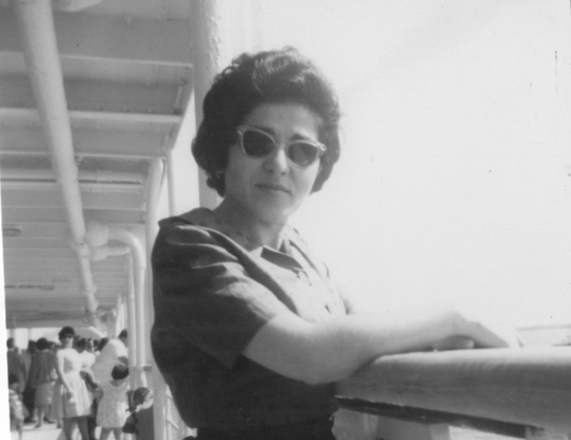
The trauma experienced by our elders is undeniably part of who we are. It affects what we do, the way we think, how we speak and what we eat, and even our sense of humour.
On Wednesday evening and Thursday, Australian Jews – many of us the children and grandchildren of Holocaust survivors – paused to remember the trauma experienced by our elders, as we observe Yom Hashoah, a day to commemorate the Holocaust and its 6 million Jewish victims.
This year is a particularly special Yom Hashoah commemoration for me personally. Last week, I recited extracts from the testimony of my great aunt Tobcia, who died a few months ago, at an event at Monash University. Until the very end, Tobcia was a complex woman. Intelligent and well read, she had strong views and ideas, and voiced her opinions. Often loudly. She loved speaking and reading in Yiddish and had a dry wit that made me laugh.
However, Tobcia’s Holocaust experiences impacted her severely, both physically and emotionally. She never forgave God for the crimes committed against her, her family and her community. I don’t think she ever forgave humanity. Tobcia didn’t want me to read her testimony while she was alive. But now, as I read it for the first time, I start to understand her a little better. She wrote:
One night in the distance we saw flames. We asked what they were about. One of the guards, a Christian, himself a prisoner, answered: ‘Do you not smell it?’ And truly we smelled a peculiar stench around us, bitter and asphyxiating. The guard added: ‘They are burning gassed people in the crematoria.’ We did not believe this. No one was able to believe; it was impossible to believe such a horrifying thing.
If the Holocaust demonstrates the worst of what humanity is capable of, in my view, human rights is our best tool to prevent it from happening again. It is our way of giving substance to the weary call ‘Never Again’.
It was in the aftermath of the Holocaust that many of the world’s sovereign states, including Australia, came together and signed the United Nations Charter and adopted the Universal Declaration of Human Rights and other international human rights instruments.
This was the moment when the world came together and recognised that human rights needed to be more than symbolic gestures and good intentions. While international human rights treaties aren’t enforceable under Australian law, the treaties that we are a party to are intended to be binding and turned into domestic law in Australia. Australia is one of the few Western democracies without a national Human Rights Act. In Victoria, however, we are lucky – the Victorian Charter of Human Rights and Responsibilities (the Charter) is our expression of the International Covenant on Civil and Political Rights.
When the Charter became Victorian law around 12 years ago, our Parliament chose to protect human rights in three main ways. First, any new law to be considered by Parliament requires a statement of Charter compatibility that scrutinises how the new law compares with Charter rights. If there is an inconsistency between a proposed law and a Charter right, the statement must explain why and how.
Second, courts and tribunals are obliged to interpret all Victorian laws, as far as is possible, in a way that is compatible with human rights.
Third, the Charter makes it unlawful for public authorities (including government departments, agencies and local councils) to act in a way that is incompatible with a human right, or to fail to give proper consideration to a relevant human right when making decisions.
Working together, these three mechanisms create a ‘dialogue’ model of rights – a continuous conversation about human rights between Victorian public authorities, Parliament, the courts and the Victorian community. This dialogue model is designed to ensure that human rights are considered in the development of laws and policies, in the delivery of public services, and in government decision-making.
Upholding human rights requires vigilance – growing a human rights culture is an ongoing and incremental process that requires a sustained commitment over many years. Genocides and serious human rights violations have occurred since the Holocaust and are still occurring.
While, the Charter is not perfect – we know that human rights laws cannot and will not prevent all human rights abuses from occurring – it still plays a vital role in Victoria. Through my work at the Victorian Equal Opportunity and Human Rights Commission, I see the Charter in action every day and the important role it plays in telling our public authorities that human rights are a fundamental part of their jobs and their decisions.
Promoting and upholding human rights is the best we can do to ensure that the actions of our government reflect the fundamental values of freedom, equality, respect and dignity. This year on Yom Hashoah I commit myself to promoting human rights in my community, keeping in mind what can happen if we do not.
Tal Shmerling is a senior legal advisor at the Victorian Equal Opportunity and Human Rights Commission (VEOHRC). This article is republished with the permission of VEOHRC, and first appeared here.


